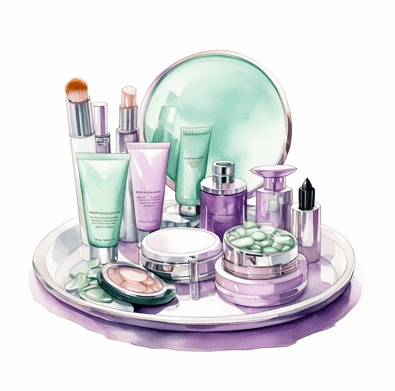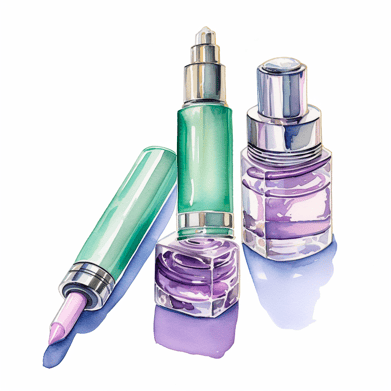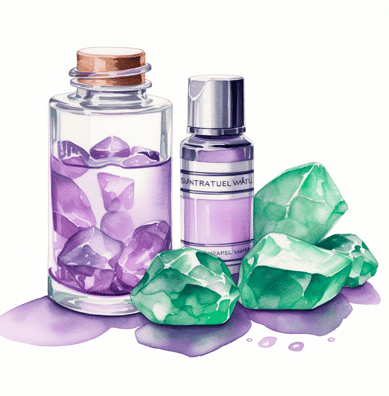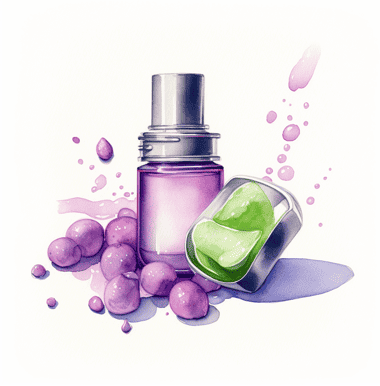
Retinol vs Collagen vs Hyaluronic Acid
In the battle of retinol vs collagen vs hyaluronic acid, each shines in its own way to support a radiant complexion. Retinol excels in enhancing skin renewal and combating signs of aging, collagen helps in maintaining skin structure and elasticity, while hyaluronic acid champions skin hydration, giving you a plump and youthful glow. Identify your skin needs and choose products accordingly for a rejuvenated appearance.
ABOUT ME
Be beauty. Be plant-based!
As a former Registered Nurse and avid plant-muncher, I’m in love with how simple plant-based foods make it easy to be beautiful.

You’ll also love:
Does Collagen Hold the Key to An Acne-Free Life?
Glow Up or Break Out: Can Collagen Supplements Cause Acne?
In today’s fast-paced environment, it’s more critical than ever to take a step back and prioritise skincare. So let’s spill the tea on retinol vs collagen vs hyaluronic acid so that you can achieve healthier and revitalised skin. These ingredients are revered for their potential to rejuvenate your skin, offering a pathway to attain a youthful and radiant glow. We will unravel the intricate details surrounding these terms, demonstrating their efficacy for various skin types while also considering the potential drawbacks.
Retinol
Purpose: Retinol, a cornerstone skincare ingredient in anti-ageing protocols, excels in mitigating signs of ageing while substantially improving skin’s texture and tone. Through stimulating skin cell turnover, it fosters skin renewal, efficiently reducing dark spots and uneven skin tone associated with sun damage and the natural ageing process.
Usage Frequency: The integration of retinol into a skincare routine should be a cautious and gradual endeavour. Start with applications a few times a week and, depending on how your skin tolerates it, you can escalate retinol to daily use.

Importance: Its vital role in skincare regimens is underscored by its efficacy in reducing fine lines and wrinkles. By fostering collagen production, retinol promotes a youthful and rejuvenated complexion, addressing sun damage and uneven skin tone adeptly.
Caution: Despite its considerable benefits, it is known to cause dryness and irritation, particularly for individuals with sensitive skin types. It is prudent to initiate its use with lower concentrations to assess skin tolerance accurately. Moreover, it necessitates stringent sunscreen application due to an increase in sun sensitivity.
Collagen
Purpose: Collagen stands as a fundamental agent in maintaining skin structural integrity, ensuring elasticity and hydration are optimised. Incorporated in a variety of products including creams and supplements, it aims to alleviate signs of ageing, providing a more youthful skin appearance.
Usage Frequency: Collagen formulations, available in creams and supplements, are conducive to daily usage, fostering a routine that nourishes the skin effectively.
Importance: Occupying a central role in skin health, it aids in mitigating the appearance of wrinkles, presenting a robust solution to maintain a youthful and plump complexion.
Caution: Despite its widespread utilization, the effectiveness of collagen supplements remains under comprehensive research scrutiny. Moreover, there is a substantive discourse regarding the potential limitations of topical applications given the large molecular size of collagen, which might impede skin penetration, thereby limiting its efficacy.

Have you read?
Does Collagen Hold the Key to An Acne-Free Life?
Hyaluronic Acid
Purpose: Hyaluronic acid emerges as a quintessential hydrating agent in skincare, renowned for its moisture-retention capabilities, thereby facilitating a plump and youthful skin demeanour while effectively diminishing fine lines.
Usage Frequency: Suitable for daily application, hyaluronic acid is a staple in a myriad of skincare products aimed at enhancing hydration, offering a vibrant and revitalised complexion.
Importance: Hyaluronic acid is indispensable in hydration-focused skincare routines, targeting dryness and aiding in the removal of dead skin cells while promising a reduction in the appearance of fine lines and furnishing a dewy complexion.
Caution: Despite its advantageous properties, it may, in certain dry environments, extract moisture from the skin, potentially inducing dryness. It is advisable to pair it with other moisturizing agents to safeguard the skin’s moisture levels effectively.
You’ll also love:
Protein In Hair And Nails: Nature’s Beauty Bounty
Food With Retinol, Collagen and Hyaluronic Acid
In the realm of skincare, nurturing your skin from the inside out is just as crucial as the topical applications we rely on daily. Through a plant-based diet, one can foster the production of retinol, collagen, and hyaluronic acid. Let us delve into the plant-based sources rich in these nutrients:

Food with Retinol
Though retinol itself is not found naturally in plant-based foods, the precursor to retinol, beta-carotene, is abundant in them. By incorporating foods rich in beta-carotene, your body can convert it to retinol, effectively enhancing your skin health. Sources of beta-carotene include:
- Sweet potatoes
- Carrots
- Spinach
- Kale
- Apricots
Try these: Purple Hasselback Sweet Potatoes at Emelie Eats
Food with Collagen
Collagen is a protein consisting of amino acids, all of which you can find in a plant-based diet. While direct plant sources of collagen are unavailable, one can encourage collagen production through a diet rich in various nutrients like vitamin C, proline, and glycine. Foods that can help in collagen production include:
- Citrus fruits (rich in Vitamin C)
- Berries
- Garlic
- Tomatoes
- Pumpkin seeds

Food with Hyaluronic Acid
Although the direct plant-based sources of hyaluronic acid are limited, there are benefits to consuming foods rich in the amino acids that synthesise hyaluronic acid. Foods to enhance hyaluronic acid production encompass:
- Soy products
- Leafy greens
- Root vegetables like potatoes and sweet potatoes
- Citrus fruits
By embracing a diet replete with these nourishing foods, not only are you promoting radiant skin but also fostering overall well-being. The more plant-based foods you eat, the healthier and more glowing your skin will be.
Deep Dive into Retinol
In the sophisticated landscape of skincare, retinol and its highly potent derivative, retinoic acid, occupy critical positions. Sourced from vitamin A, these components deliver a multitude of benefits targeted to aid mature and sensitive skin types, thus cementing their role as invaluable components in your skincare regime.
Exploring further, we find an elaborate selection of retinol products accessible in the marketplace, each pledged to champion your skin’s journey to optimum health. Take, for example, retinol serum — a crafted formulation that leverages the many benefits of retinol to rejuvenate your skin overnight, laying the groundwork for a fresh and vibrant appearance each morning.

Before we become too engrossed in the benefits, it is pertinent to understand the range of effects these products can have. While renowned for enhancing skin texture by reducing signs of ageing and promoting cellular renewal, retinol products can sometimes be too potent, especially for sensitive skin, leading to dryness and irritation. Furthermore, a meticulous introduction to your skincare routine is necessary to allow your skin to acclimatise to its powerful effects, thereby mitigating potential adverse reactions.
As we progress, it becomes vital to adopt a cautious approach in the integration of retinol products into your routine, emphasising a gradual inclusion to foster a harmonious adaptation process. This tactic not only upholds the promise of a complexion brimming with health and youthful vitality but also ensures safety and efficacy in your skincare journey.
Therefore, as you embark on the road of exploring retinol products, it is vital to be aware of both their potential benefits and downsides, fostering a skincare routine that nourishes and protects your unique skin type.
Deep Dive into Collagen
Now we encounter the domain of collagen products, a realm that has heralded unprecedented advancements in nurturing skin health. This deep-dive into collagen brings us face-to-face with the intricate processes of collagen and elastin production, both of which stand as pillars in maintaining skin’s suppleness and youthful vigour.
Collagen, often referred to as the most abundant protein in our bodies, is the linchpin in ensuring skin’s elasticity and strength. This marvel protein works hand-in-hand with elastin to fortify the skin’s structure, paving the way for smooth skin that is resilient and full of life.

A plethora of products, from creams to supplements, are designed to boost the natural synthesis of collagen, presenting themselves as robust allies in the fight against the appearance of wrinkles and the loss of skin elasticity. Engaging with these offerings promises not just a superficial facelift but a deep-seated nurturing of the skin, promoting a radiant and youthful appearance, especially for mature skin.
However, as we embrace the collagen revolution, it is vital to tread with an informed perspective. While collagen products echo the promise of rejuvenated skin, there exist certain limitations. The effectiveness of collagen supplements, for instance, is still under meticulous research, with decisive results yet to be affirmed. Moreover, not all products can traverse the skin barrier efficiently, potentially curbing the full spectrum of their benefits.
Yet, championing the production of collagen naturally, through careful selection of products that support both collagen and elastin production, could be your ticket to unlocking a skin that defies age and blooms with health.
Deep Dive into Hyaluronic Acid
Venturing yet deeper into the vibrant sphere of skincare, we stumble upon the wonder that is hyaluronic acid, a powerhouse in restoring hydration and vitality to dry and weary skin. With products such as hyaluronic acid serums leading the charge, the goal is to lock in moisture effectively, presenting a complexion that is rejuvenated and full of life.
Utilising these products to their fullest potential means understanding the finer details. For instance, if your skin is on the sensitive side, it would be prudent to avoid formulations that combine hyaluronic acid with certain other potent agents such as lactic acid, glycolic acid, or salicylic acid. While these acids have their merit in addressing various skin concerns, they might be a bit too assertive, potentially compromising the skin barrier and ushering in dryness and irritation.
Despite these words of caution, there is a lot to celebrate when it comes to hyaluronic acid products. Correctly harnessed, they stand as formidable allies in reducing the appearance of fine lines, offering a more youthful and vibrant complexion that is prepared to face each day with a radiant glow.
Navigating the Complex World of Acids in Skincare
As we forge ahead in our skincare exploration, it becomes imperative to unravel the role of various acids that have become mainstays in modern skincare formulations. Acids such as glycolic acid, lactic acid, and salicylic acid are renowned for their exfoliating properties, aiding in the renewal of skin cells and fostering a smoother skin texture.
However, it is crucial to approach these ingredients with caution, especially if your skincare concerns revolve around sensitive or dry skin. While these acids can offer remarkable results in refining skin texture and addressing issues such as acne, they can potentially compromise the skin barrier, leading to irritation and dryness.
Furthermore, it’s important to note the presence of ferric acid in some formulations, an ingredient less commonly discussed but holds significance in skincare products, especially concerning its antioxidant properties. Understanding the nuanced roles of these acids can be a potent tool in crafting a skincare routine that is both effective and safe, fostering a skin environment that is healthy and vibrant.
Addressing Unique Skin Concerns
As we further venture into the labyrinthine world of skincare, it’s time to pivot our focus to the concerns and needs of various skin types – be it dry skin, sensitive skin, acne-prone skin, or mature skin. Our endeavor is to provide you with a toolkit that caters precisely to your skin’s unique demands, helping you forge a path towards a radiant and healthy complexion.
For the individuals blessed with mature skin, a careful selection of products aiming to enhance skin barrier function can be a godsend, promoting a skin texture that is both smooth and resilient. Meanwhile, those with sensitive skin would benefit from a regimen that prioritises gentle, nourishing ingredients, capable of supporting the skin without causing irritation.
And let’s not overlook the concerns of dry and acne-prone skin types. Hydrating products, perhaps infused with hyaluronic acid, can offer the moisture seal that dry skin craves. In contrast, acne-prone skin may find solace in formulations with salicylic acid that targets breakout-causing impurities without compromising the skin’s natural balance.
In addressing the unique requirements of different skin types, it is pivotal to choose products that not only enhance your skin’s natural beauty but also protect and nurture your individual skin barrier, allowing it to thrive amidst daily challenges.
Crafting a Regimen that Speaks to Your Skin’s Soul
As we edge closer to the conclusion of our enlightening journey through the dynamic landscape of skincare, we find ourselves at the crucial juncture of crafting a personal skincare regimen — a regimen that echoes the desires and needs of your skin, offering a sanctuary of nurturing and revitalisation in your daily routine.
Here, we encourage you to listen intently to your skin, understanding its cravings and nuances. Whether it leans towards products rich in retinol, collagen, or hyaluronic acid, the guiding principle remains to foster a regimen grounded in understanding and empathy for your skin’s unique narrative.
In this endeavor, don’t shy away from experimenting with different combinations of skincare products — be it serums rich in vitamins or creams infused with collagen. The objective is to foster a space of harmony, where your skin feels heard and cherished, ready to face the world with a radiant and vibrant glow each day.
FAQ: Retinol vs Collagen vs Hyaluronic Acid
What is best: collagen, retinol, or hyaluronic acid?
Determining the “best” among collagen, retinol, and hyaluronic acid largely depends on individual skin needs and concerns. Collagen generally supports skin elasticity and hydration, making it a great option for dry and mature skin. Retinol can be your ally in fighting signs of ageing such as fine lines and uneven skin tone, making it a potent ingredient for an anti-ageing regimen. Hyaluronic acid stands out in hydrating the skin, helping to reduce the appearance of fine lines and maintaining a youthful and dewy complexion. It might be beneficial to incorporate all three into your skincare routine, given their different, yet complementary, benefits.
Is it better to take collagen or hyaluronic acid?
Both collagen and hyaluronic acid offer distinct benefits. While collagen supplements can potentially help in enhancing skin elasticity and reducing wrinkles, hyaluronic acid is known for its exceptional ability to hydrate skin from within. Depending on your skin concerns, you might opt for one over the other, or even use both in tandem to harness their individual strengths. However, it is always recommended to consult with a healthcare provider before introducing any supplements into your regimen.
Which is better, retinol or collagen?
When deciding between retinol and collagen, consider your primary skincare goals. If you are looking to vigorously tackle signs of ageing like fine lines and uneven skin tone, retinol might be your go-to. On the other hand, if you wish to foster skin elasticity and maintain a youthful bounce in your skin, collagen could potentially be more beneficial. Many individuals find that using products with both ingredients allows them to reap the full spectrum of benefits.
Should I use retinol and hyaluronic acid together?
Using retinol and hyaluronic acid together can indeed be beneficial as they offer complementary effects. While retinol promotes skin renewal and works on reducing signs of ageing, hyaluronic acid can aid in hydrating the skin, which might get dry due to the cell turnover encouraged by retinol. Thus, incorporating hyaluronic acid can help in mitigating the potential dryness caused by retinol, facilitating a smooth and nourished complexion.
Can you use collagen and retinol at the same time?
Yes, you can use collagen and retinol at the same time. In fact, using them together might offer synergistic benefits, with retinol encouraging skin cell turnover and collagen aiding in maintaining skin structure and elasticity. This combination can help in achieving a balanced approach to skincare, fostering a complexion that is both youthful and resilient. However, as always, it’s essential to patch test new product combinations to ensure they work harmoniously for your specific skin type.
ABOUT ME
Every woman’s skin and health can benefit by eating some more plants! I want to help you embrace the power of plant-based foods in simple and easy ways, so that you can lead a more beautiful life!
Life’s too short to not live your most beautiful, badass life.
